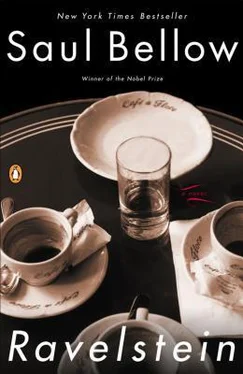But since Ravelstein had a large-scale mental life-and I say this without irony, his interests really were big-he needed to know everything there was to know about his friends and his students, just as a physician pursuing a diagnosis has to see you stripped naked. The comparison breaks down when you remember that the doctor is bound by ethical rules not to gossip about you. Ravelstein was not so bound. When I was a kid in the thirties the notion of the "naked truth" was in the air. "Let's have the naked truth." An Englishwoman named Claire Sheridan wrote a memoir called The Naked Truth. It was appropriate that she should have visited revolutionary Russia, where she seems to have been on familiar terms with Lenin and Trotsky and many other prominent Bolsheviks.
But all this is mere background.
Let's get on with it.
Ravelstein, speaking still of Vela, said, "You make her an offering-beautiful country summers-but she doesn't care about this place, Chick, or she'd spend more time here. And so I find it curious that you should try so hard. However," he continued, "let me say what I see in all this. I see the Jew, the child of immigrants, taking the American premises seriously. You are free to do what you like, and can realize your wishes fully. It's your privilege as an American to buy land and build a house where you live in full enjoyment of your rights. It's true there's nobody here but yourself. So you have built this New Hampshire sanctuary where you're surrounded by your family mementos. Your mother's Russian samovar is a beautiful object. It's thee-ah thee-ah terribly handsome. But it's far far far from the city of Tula-Tula was for samovars as coals were to New castle. Thee-ah thee-ah Tula samovar has never been in such a foreign location of maximum deracination. As for you, Chick, you're making your total American declaration of rights. It's very brave of you to do it but it's also off the wall…. For miles around, you're the only Jew. Your neighbors have one another to rely on. Whom do you have-a gentile wife? You've got a theory-equality before the law. It's a big comfort to have constitutional guarantees on your side, and it's certain to be appreciated by other devotees of the Constitution itself…."
He was enjoying himself. I didn't much mind. To be shown a pattern in my activities diverted me.
"I have to assume also that your tax bill is high…."
"It certainly is. And there are new education assessments yearly."
He said, "I can imagine what sort of education they get here. Have you ever attended a town meeting?"
"Once I did."
"And your high-stepping wife?"
"She was there, too." Before the cycle of obscure or new diseases began, Ravelstein and I had many fun conversations like the above. He seemed to think that I would value his opinion of my activities. Up to a point I did, in fact, find them useful. He said, for instance, that I was anything but risk-averse. And he asked, "I am fascinated by the marriages you've made-you remember Steve Brody, don't you?"
"The guy who jumped from the Brooklyn Bridge on a bet."
"That's him-one of those spirited people."
See Plato's Republic, especially Book IV. I did not study those great texts closely, but there wasn't the slightest hope of following Ravelstein's thoughts if you were ignorant of them entirely. I was not really intimidated by them. By now I am as much at home with Plato as with Elmore Leonard.
"There's nothing I say to you that you don't immediately understand," Ravelstein would sometimes declare, but it's possible that he had cultivated the art of conversation with good old Chick and would take special care to go slowly with him. And it's possible also that as a genius educator he knew how much traffic my mind would bear.
In New Hampshire he would press me again and again to repeat old jokes, old gags, and vaudeville routines. "Do me that Jimmy Savvo song." Or else "How does the furious husband bit go, again? The heartbroken man who tells his buddy 'My wife cheats on me."
"Oh, yes. And the buddy says, 'Make love to her every day. Once a day at least. And in a year that will kill her.'
"'No!' The guy is astonished. 'Is that the answer?'"
"'Once a day. That often, she'll never survive…'
"Then a sign is brought on stage. You may remember how that was done. An usher with a round cap and a double row of buttons would carry out a tripod with a sign. In bold print this sign read, 'Fifty-one weeks later.' And then the husband is pushed onstage in a wheelchair by the wife. He looks very weak. Muffled in blankets like an invalid. The wife is blooming. She is dressed for tennis and has the racket under her arm. She fusses over him, tucks him in, kisses him. His eyes are closed. He looks like death. She says, 'Rest, darling, I'll be back after my set-real real soon.' As she strides off the feeble husband brings his hand up to his face and behind his hand in a wonderful vaudeville whisper he says confidentially to the audience, 'She don't know it, but she's got only a week to live.'"
Ravelstein threw his head back at this. Shutting his eyes he flung himself bodily backward into laughter. In my own different style I did the same thing. As I've said before it was our sense of what was funny that brought us together, but that would have been a thin, anemic way to put it. A joyful noise-_immenso giubilo__-an outsize joint agreement picked us up together, and it would get you nowhere to try to formulate it.
In those days, Rosamund had a long ride on the elevated train. She crossed the huge breadth of the city, and she had the faces of her fellow passengers to train her thoughts and feelings on. She brought me the week's mail and the phone messages. For two years she had been my graduate-assistant, typing and faxing for me. Vela was condescending to her and would not even invite her to sit down. I would offer Rosamund a cup of tea and try to make her comfort able. Although slightly threadbare, Rosamund was ultra-neat, but Vela considered her a frumpy little thing. Vela's airs were grandly aristocratic. She bought herself very expensive costumes in strange materials like ostrich hide. One season she bought ostrich only-a large ostrich hat in bushranger style, with follicles from which the feathers had been pulled. She had an ostrich-hide bag slung over her shoulder and ostrich boots and gloves. On her full professor's salary, she had lots of money to spend. Her straight-profiled beauty was the only kind of beauty that mattered.
Vela said, "Your little Rosamund is dying to take care of you."
"I think she believes I'm happily married."
"In that case why does she always bring a bathing suit?"
"Because it's a long hot trip on the El and she enjoys swimming in the lake."
"No, it's because you can see her beautiful figure. Otherwise she'd go swimming at her own end of town."
"She feels safer here."
"You don't spend all your time dictating letters."
"Not all of it." I granted that.
"Well, what do you talk about-Hitler and Stalin?"
These, to Vela, were contemptible topics. Compared to chaos physics, they didn't even exist. And she was born, mind you, within an hour's jet flight of Stalingrad, but her parents had conspired to keep her impeccably innocent of the Wehrmacht and the gulags. Only her own esoteric studies mattered. Still, Vela curiously had a talent for politics. She made certain that people would think well of her. It was her wish that they should see her as a warmhearted, friendly, generous person. Even Ravelstein said of her, "People are flattered by her attentions. She buys the most expensive birthday presents."
"Yes. It's a funny thing how she attracts acquaintances and turns them away from me. I don't feel like getting into a spending con test."
"What are you trying to tell me, Chick, that she's some kind of space alien?"
Читать дальше












